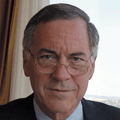| STEVE H. HANKE | Steve H. HANKE |
|
CONTRIBUTING EDITOR Professor of Applied Economics at the Johns Hopkins University & Columnist at Forbes magazine |

|
Democracy or Liberty?: The Middle East and North Africa |
Many will be shocked to learn that the word “democracy” was neither used in the Declaration of Independence nor in the Constitution. Indeed, the Founding Fathers were anxious and fearful of allowing any form of tyranny, including the tyranny of the majority.
This essay should be read and meditated on by all those who think they have a right to influence society. A real gem!”
Jacques de Larosičre*
*Advisor to the BNP Paribas in Paris and formerly the President of the European Bank for Reconstruction and Development, the Managing Director of the International Monetary Fund, and the Governor of the Banque de France.
Recent events in the Middle East and North Africa (MENA) illustrate once again how language and history are abused. Whether on the streets of Cairo or the Internet, words are so misused that they have lost their original meaning. Semantic sliding is an art that has been practiced by the chattering classes throughout the ages. No less than George Orwell honed in on these habits of mind and deed in his classic 1946 essay “Politics and the English Language.” From Washington to MENA, a cacophony of voices are sending forth the Tower of Babel’s word of choice: democracy.
In the aftermath of World War I, President Woodrow Wilson set out to make the world safe for democracy. Since then, U.S. Presidents have marched to the drumbeat of Wilsonian idealism. Indeed, most U.S. foreign policy is carried out under the pretext – and in some cases perhaps the genuine belief – that America is delivering democracy to the rest of the world. President Barack Obama’s rationale for foreign engagements is, therefore, neither new nor unusual.
Most people, including most Americans, would be surprised to learn that the word “democracy” does not appear in the Declaration of Independence (1776) or the Constitution of the United States of America (1789). They would also be shocked to learn the reason for the absence of the word “democracy” in the founding documents of the U.S.A. Contrary to what propaganda has led the public to believe, America’s Founding Fathers were skeptical and anxious about democracy. They did not confuse the words “democracy” and “liberty”; they knew that those two words were not synonyms; and they were well aware of the evils that accompany a tyranny of the majority. Accordingly, the Framers of the Constitution went to great lengths to ensure that the federal government was not based on the will of the majority.
The Constitution divided the federal government into legislative, executive and judicial branches. Each branch was designed to check the power of the other branches. The Founders did not want to rely only on the voters to check government power. As a result, citizens were given very little power to select federal officials. Neither the President, members of the judiciary nor the Senate were elected by direct popular vote. Only the members of the House of Representatives were directly elected by popular vote. Even in this case, the franchise was quite restricted.
If the Framers of the Constitution did not embrace democracy, what did they adhere to? To a man, the Framers agreed that the purpose of government was to secure citizens in John Locke’s trilogy of the rights to life, liberty and property. The Framers wrote extensively and eloquently. On property, for example, John Adams wrote that “the moment the idea is admitted into society, that property is not as sacred as the laws of God, and that there is not a force of law and public justice to protect it, anarchy and tyranny commence.”
The Founders’ actions often spoke even louder than their words. Alexander Hamilton, a distinguished lawyer, took on many famous cases out of principle. After the Revolutionary War, the state of New York enacted harsh measures against Loyalists and British subjects. These included the Confiscation Act (1779), the Citation Act (1782) and the Trespass Act (1783). All involved the taking of property. In Hamilton’s view, these Acts illustrated the inherent difference between democracy and the law. Even though the Acts were widely popular, they flouted fundamental principles of property law. Hamilton carried his views into action and successfully defended – in the face of enormous public hostility – those who had property taken under the three New York state statutes.
The Constitution was designed to further the cause of liberty, not democracy. To do that, the Constitution protected individuals’ rights from the government, as well as from their fellow citizens. To that end, the Constitution laid down clear, unequivocal and enforceable rules to protect individuals’ rights. In consequence, the government’s scope and scale were strictly limited. Economic liberty, which is a precondition for growth and prosperity, was enshrined in the Constitution, and that’s how things remained for America’s first century of extraordinary development and growth.
